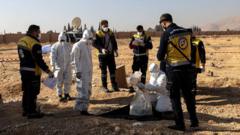Videos circulating online showcase the work of these rescuers as they meticulously excavate the graves. They uncovered a pit containing multiple body bags, with a somber note stating, "Seven bodies, eighth grave, unknown." The team perseveres, collecting remains and documenting DNA samples for future identification. Rescue team member Ismael Abdullah reflects on the gravity of their task, highlighting the thousands still unaccounted for and the extensive efforts required to uncover the truth surrounding their fates.
As the conflict unfolds, estimates suggest that over 100,000 individuals have been reported missing since 2011, with research indicating that a significant proportion have likely succumbed to torture. Recent developments include the actions of the rebel group Hayat Tahrir al-Sham, which has been reporting abandoned prisons, leading to the emergence of new mass burial sites. Observers assert that nearly 100,000 bodies might already be buried across the nation, even as grim accounts from witnesses describe scenes of security forces dumping bodies in refrigerated vehicles and hastily covering them.
Local witnesses provide harrowing accounts of their experiences, including religious leaders who were forced into overseeing burials, asserting that the state sought to suppress any evidence of these atrocities. As these discoveries proliferate in locations like Qutayfah and Husseiniyeh, relatives of the missing scramble for traces of their loved ones among the discarded records—an evident quest for closure amid devastating loss.
The situation underscores the urgent need for international support in locating, protecting, and identifying the victims buried in these mass graves. While local teams endeavor to document this dark chapter of history, the involvement of global experts is critical to ensuring that justice is served and memories of the lost can find peace through proper recognition and burial.
As the conflict unfolds, estimates suggest that over 100,000 individuals have been reported missing since 2011, with research indicating that a significant proportion have likely succumbed to torture. Recent developments include the actions of the rebel group Hayat Tahrir al-Sham, which has been reporting abandoned prisons, leading to the emergence of new mass burial sites. Observers assert that nearly 100,000 bodies might already be buried across the nation, even as grim accounts from witnesses describe scenes of security forces dumping bodies in refrigerated vehicles and hastily covering them.
Local witnesses provide harrowing accounts of their experiences, including religious leaders who were forced into overseeing burials, asserting that the state sought to suppress any evidence of these atrocities. As these discoveries proliferate in locations like Qutayfah and Husseiniyeh, relatives of the missing scramble for traces of their loved ones among the discarded records—an evident quest for closure amid devastating loss.
The situation underscores the urgent need for international support in locating, protecting, and identifying the victims buried in these mass graves. While local teams endeavor to document this dark chapter of history, the involvement of global experts is critical to ensuring that justice is served and memories of the lost can find peace through proper recognition and burial.
















